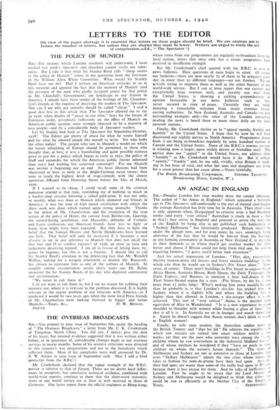THE OVERSEAS BROADCASTS
SIR,—You printed in your issue of September 6th, under the heading of " The Overseas Broadcasts," a letter from Mr. C. K. Crookshank of Tongshan, North China. You did not, I notice, give the date of his letter; but internal evidence suggested that it was written either before, or in ignorance of, considerable changes made in our overseas services in recent months. Some of his severest criticisms were directed to this country's war preparations and not to the broadcasts which reflected them. Most of his complaints were well answered by Dr. E. W. Adams in your issue of September zoth May I add a brief postscript from the B.B.C.?
Mr. Crookshank declared that the signal strength of the B.B.C. service is inferior to that of Zeesen. There are no doubt local differ- ences in reception; but conclusive technical evidence, combined with world-wide reports, continue to show that the short-wave transmis- sions of our world service are at least as well received as those of Germany. Our latest report from the official engineers at Hong-kong,
where items from our programmes are regularly re-broadcast from the local station, shows that once only has a recent programme been received in insufficient strength.
But Mr. Crookshank's chief quarrel with the B.B.C. is over its news bulletins. Here questions of taste begin to enter. Of course our bulletins---there are now nearly 70 of them to be prepared every day in more than 20 different languages—are not flawless. We are actively trying to improve them as well as the other features of our world-wide service. But I can at least report that our current and exceptionally large overseas mail, and notably our mail from the United States, is showing a striking preponderance of opinion favourable to our news bulletins such as they
never secured in time of peace. Certainly they are today enjoying a remarkable welcome from many overseas broad- casting authorities. In New Zealand, Australia and Canada—to give outstanding examples only—the voice of the London announcer reading the news is heard three or more times daily on the local network stations.
Finally, Mr. Crookshank invites us to "appeal openly, frankly and humbly " to the United States. I hope that by now he will have discovered our nightly service to North America. Programmes drawn from it are being re-broadcast regularly by some hundred stations in Canada and the United States. None of the B.B.C.'s oversea services is winning now a larger, more widely drawn or friendlier mail. The service does not " appeal" to the United States, nor address them " humbly" as Mr. Crookshank would have it do. But it reflects " openly," "frankly " and, let me add, vividly, what Britain is think- ing in her hour of trial, and what her sons and daughters are doing for a cause greater than her cause alone.—Yours faithfully,


























 Previous page
Previous page